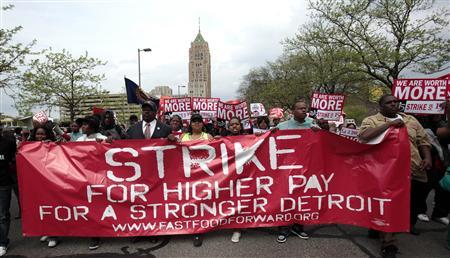
Hundreds of fast-food employees in Detroit walked off the job on Friday, temporarily shuttering a handful of outlets as part of a growing U.S. worker movement that is demanding higher wages for flipping burgers and operating fryers.
The protests in the Motor City - which is struggling to recover from the hollowing out of its auto manufacturing sector - marked an expansion in organized actions by fast-food workers from ubiquitous chains owned by McDonald's Corp, Burger King Worldwide and KFC, Taco Bell and Pizza Hut parent Yum Brands Inc.
Fast-food workers, who already have taken to the streets in New York, Chicago and St. Louis, are seeking to roughly double their hourly pay to $15 per hour from around minimum wage, which in Michigan is $7.40 per hour.
Organizers said more than 400 people turned out for the Detroit event, the most to date.
They also said the walk-outs forced the temporary closures of two McDonald's restaurants, a Burger King, a Subway, a Long John Silver's and a Popeyes in Detroit - a claim some chains disputed.
Outside a Burger King on 8 Mile in Detroit, employee Claudette Wilson said she's tired of poor wages, especially at a time when the fast-food industry continues to grow.
"I make minimum wage, which is what I made when I started working in fast food three years ago," the 20-year-old college student said. "I can't understand how the industry is growing but our wages aren't."
Organizers said the Detroit metro area has 53,000 fast-food jobs, which pay at or just above minimum wage.
The fast-food workforce is twice as large as that of the region's famed auto manufacturing sector and is projected to grow faster than the region's overall workforce in the coming years, organizers said.
"People can't make a living at $7.40 a hour," said Rev. Charles Williams II, a protest organizer. "Many of them have babies and children to raise, and they can't get by with these kind of wages."
Those workers face high hurdles in their fight for better pay. Low-wage, low-skill workers lack political clout and face significantly higher unemployment than college graduates.
U.S. President Barack Obama proposed raising the federal minimum wage in his State of the Union address as a way to help lift some workers out of poverty. But critics of such a move, including representatives for the nearly $200 billion U.S. fast-food industry, say it would kill jobs by burdening small businesses with higher costs.
PROTESTS, DISPUTES
At a Long John Silver's on Detroit's east side, a lone manager tended the restaurant as the presence of protesters appeared to stifle business.
A McDonald's spokeswoman told Reuters its Michigan restaurants were "open, and operating as usual". Burger King said none of its restaurants were shut down and no workers walked off the job.
Representatives from Subway, Long John Silver's and AFC Enterprises' Popeyes did not immediately respond to requests for comment.
Margaret Neal, 52, said frustration with the low wage she earns after more than a decade working at a McDonald's in Detroit prompted her to join Friday's protests.
Asked about her pay, Neal said: "You don't even want to know, I've been there 15 years. I'm still making $8.83 (an hour). That's not right."
Neal, who works full-time, says her bosses have told her she is "maxed out" at her current wage and ineligible for an increase.
The vast majority of McDonald's more than 14,000 U.S. restaurants are owned and operated by franchisees. The company said in a statement that McDonald's employees are paid competitive wages, have access to a range of benefits and opportunities for training and career advancement.
The Detroit action was put together by the Michigan Workers Organizing Committee, an independent union of fast-food workers, that is supported by community, labor and faith-based groups such as the Interfaith Coalition of Pastors, UFCW Local 876, SEIU Healthcare Michigan and Good Jobs Now.





